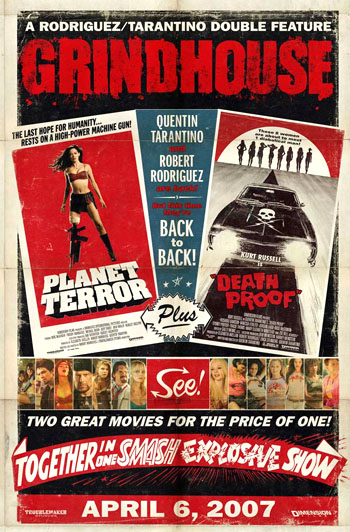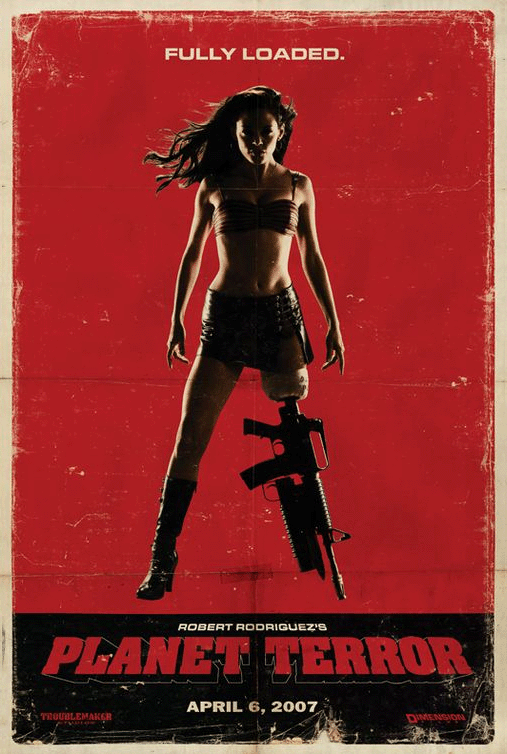 GRINDHOUSE (2007, directed by Robert Rodriguez and Quentin Tarantino, 191 min., U.S.)
GRINDHOUSE (2007, directed by Robert Rodriguez and Quentin Tarantino, 191 min., U.S.)
BY DAN BUSKIRK FILM CRITIC
What has happened to Quentin Tarantino? There was a time when the Animals were considered as good as the Stones, a time when Stallone was touted as the next Brando and a time when Tarantino was thought of as one of the next important American filmmakers. Grindhouse, a double feature pairing “Death Planet,” from Sin City‘s Robert Rodriguez, with “Death Proof,” a new feature from the only video store clerk to win Golden Palm at Cannes. With it, Tarantino extends his vacation from ambition and delivers his third 70s exploitation rip-off in 10 years. Tarantino’s half of Grindhouse ressurects the not-too-deeply-buried Kurt Russell and is mercifully brief when compared to Kill Bill’s elephantine length, but its preening self-consciousness makes it his least satisfying outing since Four Rooms.
Seldom do you meet a person who doesn’t describe himself as a good judge of character, so perhaps I’m just too hesitant to admit I was wrong about the guy. Although there were detractors who noted his glib fixation on violence and tough guys, Tarantino’s ability to place these characters in a recognizable world — one where pop culture, crummy apartments and bullshitting conversation met Hollywood staples like hitmen and bank robbers — was a truly fresh vision, but one that has now been completely absorbed and metabolized by TV and other films. And although grindhouse mayhem gave his original films their kick, Tarantino was just as quick to reference Robert Altman, Stanley Kubrick and the masters of foreign cinema. But since the lukewarm reception to his more mature Jackie Brown in ?97, Tarantino has withdrawn into his obsession with 70s exploitation cinema and this latter day films are long on hommage and pastiche(the clothes, the cars, the violence) while completely missing the genre’s lean efficiency or political subversiveness.
The plot is built around two different cars of women and their confrontations with Russell’s “Stuntman Mike,” who is found in Guero’s Taco Bar in Austin, Texas, his steel-reinforced stunt car parked out front with a skull peering from its hood. Stuntman Mike is a fixture at the bar, and when the women don’t recognize the old TV shows he doubled on, you can’t help but think he’s a little like an aging Tarantino himself, spouting old pop cultural references that are increasingly obscure and irrelevant to hot young chicks. Their slights are avenged when Stuntman Mike attempts to run their car down in a late-night, hot-rod death match.
But after the non-stop kick of Rodriguez’s “Death Planet” opening and the bevy of great fake trailers, Tarantino puts a kibosh on the momentum and lards the film up with his patented brand of long-winded dialogue. When put into the mouth of Christian Slater’s comic book clerk in True Romance, these sort of trivia-laden, blustery tough guy monologues made sense. Hearing Tarantino’s very specific voice coming out of a group of attractive women is a disconnect that just doesn’t fly, especially when he slackens the action and lets the yapping roll on in scene after scene. To hear these Pulp Fiction-isms unveiled again 13 years later (and with considerably less wit) makes “Death Proof” seem about as fresh as an episode of “90210.”
and lets the yapping roll on in scene after scene. To hear these Pulp Fiction-isms unveiled again 13 years later (and with considerably less wit) makes “Death Proof” seem about as fresh as an episode of “90210.”
He even does a complete send-up of the diner scene from Reservoir Dogs, this time with a cast of women, all of whom are quite good with what they’re given. The hotties go on about joint etiquette, or make-out habits or some other riff seemingly stolen from some late night stand-up bit. Such homage to one’s self is a disturbingly insecure move and reminds me of the time I saw a member of the defunct band Camper Van Beethoven working in a record store wearing a Camper Van Beethoven t-shirt. Ouch.
If I wasn’t able to resist placing Tarantino under the pop psychology microscope, I’d say this is a movie from a fellow insecure of his achievements, who no longer impresses women with his knowledge of Sam Fuller films and now fantasizes about killing them along the side of the highway. And unfortunately Tarantino doesn’t even know how to make good a movie out of that twisted impulse. Maybe because he’s too close to Stuntman Mike, he never presents Russell’s character as scary or even particularly evil, making his humiliating comeuppance an empty payoff. And never blowing the payoff should really be a cardinal rule in whatever they’re calling grindhouse these days.
Rodriguez’s “Death Planet” deserves better than to be Tarantino’s opening act. Like Sin City, the look of it is much of its thrill; he successfully summons the look of an old print of Romero’s Dawn of the Dead, and has a lot of fun playing with the jittery print splices and scratches, the film becoming more scratchy and jittery whenever the action gets good, as it does with frequency. One of my favorite films from this year’s Philadelphia Film Festival, the truly creepy S&Man, questions where horror can go after the Abu Ghraib torture photos. Rodriguez rummaged around his subconscious and came up with a couple of answers. For guys, it’s a the jar of testicles, naked of their sacs. For the gals, it’s QT’s cameo as a diseased rapist, his penis melting like a candle in a house fire. Consider the gauntlet thrown.
